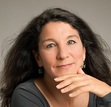Susan Rich's Blog, page 74
February 12, 2011
Open Letter: Do You Write Poems Concerning Race? And Why or Why Not?
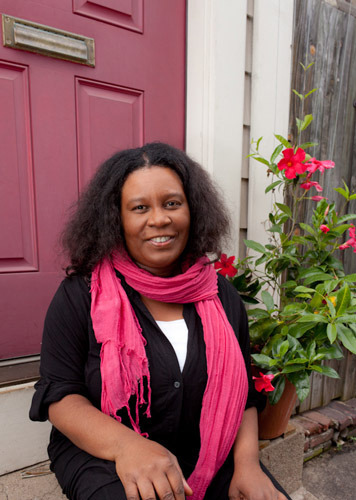
Many of you have likely been following the AWP aftermath concerning a panel that surprisingly, dealt with race. Many of you have no idea what I'm referring to.
To find Claudia Rankine's initial presentation, you can go to her website. You can also find some fine poetry there. I applaud Rankine's call to poets to openly discuss race. I'm hopeful that this will lead to a nuanced and varied dialogue. As crazed as I am with school work, I'm going to make time to add my voice to the song. I hope you will consider joining in.
Dear friends,
As many of you know I responded to Tony Hoagland's poem "The Change" at AWP. I also solicited from Tony a response to my response. Many informal conversations have been taking place online and elsewhere since my presentation of this dialogue. This request is an attempt to move the conversation away from the he said-she said vibe toward a discussion about the creative imagination, creative writing and race.
If you have time in the next month please consider sharing some thoughts on writing about race (1-5 pages).
Here are a few possible jumping off points:
- If you write about race frequently what issues, difficulties, advantages, and disadvantages do you negotiate?
- How do we invent the language of racial identity--that is, not necessarily constructing the "scene of instruction" about race, but create the linguistic material of racial speech/thought?
- If you have never written consciously about race why have you never felt compelled to do so?
- If you don't consider yourself in any majority how does this contribute to how race enters your work?
- If fear is a component of your reluctance to approach this subject could you examine that in a short essay that would be made public?
- If you don't intend to write about race but consider yourself a reader of work dealing with race what are your expectations for a poem where race matters?
- Do you believe race can be decontextualized, or in other words, can ideas of race be constructed separate from their history?
- Is there a poem you think is particularly successful at inventing the language of racial dentity or at dramatizing the site of race as such? Tell us why.
In short, write what you want. But in the interest of constructing a discussion pertinent to the more important issue of the creative imagination and race, please do not reference Tony or me in your writings. We both served as the catalyst for this discussion but the real work as a community interested in this issue begins with our individual assessments.
If you write back to me by March 11, 2011, one month from today, with "OPEN LETTER" in the subject heading I will post everything on the morning of the 15th of March. Feel free to pass this on to your friends. Please direct your thoughts to openletter@claudiarankine.com.
In peace,
Claudia
openletter@claudiarankine.com Back to Messages
Published on February 12, 2011 15:13
February 11, 2011
Elizabeth Bishop in Brazil: A New Novel (new to me)
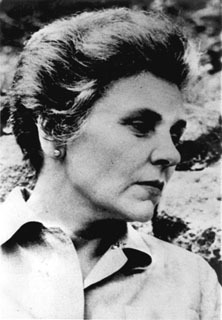 This past summer I took a chance on a novel that I thought was sure to be awful (not cheerful). How happy I was to be proven wrong. Michael Sledge, author of The More I Owe You, has written a poignant and beautiful book documenting the long standing love affair between Elizabeth Bishop and Lota de Macedo Soares. Bishop's arrival in Santos, her winning of the Pulitzer Prize, and her time teaching in Seattle at the University of Washington are all told with a light touch -- backed up by meticulous research. Catch words like "pellucid" and "binoculars" show up in unexpected spots letting us know that Sledge is familiar with the poems as well as the biography. A guilty pleasure for any Bishop fan.
This past summer I took a chance on a novel that I thought was sure to be awful (not cheerful). How happy I was to be proven wrong. Michael Sledge, author of The More I Owe You, has written a poignant and beautiful book documenting the long standing love affair between Elizabeth Bishop and Lota de Macedo Soares. Bishop's arrival in Santos, her winning of the Pulitzer Prize, and her time teaching in Seattle at the University of Washington are all told with a light touch -- backed up by meticulous research. Catch words like "pellucid" and "binoculars" show up in unexpected spots letting us know that Sledge is familiar with the poems as well as the biography. A guilty pleasure for any Bishop fan.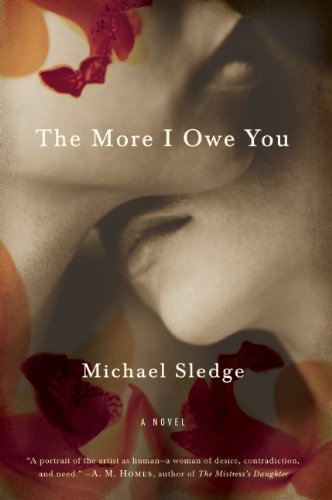
And fans of Bishop may already know that a festival in Nova Scotia is in the works for this summer. The Elizabeth Bishop Society of Nova Scotia is planning an art festival for August. See you there, perhaps?
Published on February 11, 2011 10:39
February 10, 2011
"The Fish" in Elizabeth Bishop's Own Voice
I've been listening to Miss Bishop again and again. What can we learn from a poet's voice? I hear New England and a no nonsense tone. I can assume that EB was also nervous, she isn't performing as much as trying to make it through the poem. In the final lines, "everything is rainbow, rainbow, rainbow" her voice lifts up "and I let the fish go" works with her subject and with a clear joy of completing her reading.

Published on February 10, 2011 07:29
February 9, 2011
My Favorite Elizabeth Bishop Poem: Yes, Honestly, This is It!
[image error]
Questions of Travel
There are too many waterfalls here; the crowded streams
hurry too rapidly down to the sea,
and the pressure of so many clouds on the mountaintops
makes them spill over the sides in soft slow-motion,
turning to waterfalls under our very eyes.
--For if those streaks, those mile-long, shiny, tearstains,
aren't waterfalls yet,
in a quick age or so, as ages go here,
they probably will be.
But if the streams and clouds keep travelling, travelling,
the mountains look like the hulls of capsized ships,
slime-hung and barnacled.
Think of the long trip home.
Should we have stayed at home and thought of here?
Where should we be today?
Is it right to be watching strangers in a play
in this strangest of theatres?
What childishness is it that while there's a breath of life
in our bodies, we are determined to rush
to see the sun the other way around?
The tiniest green hummingbird in the world?
To stare at some inexplicable old stonework,
inexplicable and impenetrable,
at any view,
instantly seen and always, always delightful?
Oh, must we dream our dreams
and have them, too?
And have we room
for one more folded sunset, still quite warm?
But surely it would have been a pity
not to have seen the trees along this road,
really exaggerated in their beauty,
not to have seen them gesturing
like noble pantomimists, robed in pink.
--Not to have had to stop for gas and heard
the sad, two-noted, wooden tune
of disparate wooden clogs
carelessly clacking over
a grease-stained filling-station floor.
(In another country the clogs would all be tested.
Each pair there would have identical pitch.)
--A pity not to have heard
the other, less primitive music of the fat brown bird
who sings above the broken gasoline pump
in a bamboo church of Jesuit baroque:
three towers, five silver crosses.
--Yes, a pity not to have pondered,
blurr'dly and inconclusively,
on what connection can exist for centuries
between the crudest wooden footwear
and, careful and finicky,
the whittled fantasies of wooden footwear
and, careful and finicky,
the whittled fantasies of wooden cages.
--Never to have studied history in
the weak calligraphy of songbirds' cages.
--And never to have had to listen to rain
so much like politicians' speeches:
two hours of unrelenting oratory
and then a sudden golden silence
in which the traveller takes a notebook, writes:
"Is it lack of imagination that makes us come
to imagined places, not just stay at home?
Or could Pascal have been not entirely right
about just sitting quietly in one's room?
Continent, city, country, society:
the choice is never wide and never free.
And here, or there . . . No. Should we have stayed at home,
wherever that may be?"
Elizabeth Bishop
Questions of Travel
There are too many waterfalls here; the crowded streams
hurry too rapidly down to the sea,
and the pressure of so many clouds on the mountaintops
makes them spill over the sides in soft slow-motion,
turning to waterfalls under our very eyes.
--For if those streaks, those mile-long, shiny, tearstains,
aren't waterfalls yet,
in a quick age or so, as ages go here,
they probably will be.
But if the streams and clouds keep travelling, travelling,
the mountains look like the hulls of capsized ships,
slime-hung and barnacled.
Think of the long trip home.
Should we have stayed at home and thought of here?
Where should we be today?
Is it right to be watching strangers in a play
in this strangest of theatres?
What childishness is it that while there's a breath of life
in our bodies, we are determined to rush
to see the sun the other way around?
The tiniest green hummingbird in the world?
To stare at some inexplicable old stonework,
inexplicable and impenetrable,
at any view,
instantly seen and always, always delightful?
Oh, must we dream our dreams
and have them, too?
And have we room
for one more folded sunset, still quite warm?
But surely it would have been a pity
not to have seen the trees along this road,
really exaggerated in their beauty,
not to have seen them gesturing
like noble pantomimists, robed in pink.
--Not to have had to stop for gas and heard
the sad, two-noted, wooden tune
of disparate wooden clogs
carelessly clacking over
a grease-stained filling-station floor.
(In another country the clogs would all be tested.
Each pair there would have identical pitch.)
--A pity not to have heard
the other, less primitive music of the fat brown bird
who sings above the broken gasoline pump
in a bamboo church of Jesuit baroque:
three towers, five silver crosses.
--Yes, a pity not to have pondered,
blurr'dly and inconclusively,
on what connection can exist for centuries
between the crudest wooden footwear
and, careful and finicky,
the whittled fantasies of wooden footwear
and, careful and finicky,
the whittled fantasies of wooden cages.
--Never to have studied history in
the weak calligraphy of songbirds' cages.
--And never to have had to listen to rain
so much like politicians' speeches:
two hours of unrelenting oratory
and then a sudden golden silence
in which the traveller takes a notebook, writes:
"Is it lack of imagination that makes us come
to imagined places, not just stay at home?
Or could Pascal have been not entirely right
about just sitting quietly in one's room?
Continent, city, country, society:
the choice is never wide and never free.
And here, or there . . . No. Should we have stayed at home,
wherever that may be?"
Elizabeth Bishop
Published on February 09, 2011 06:00
February 8, 2011
She's 100 Years Young: Happy Birthday Elizabeth Bishop
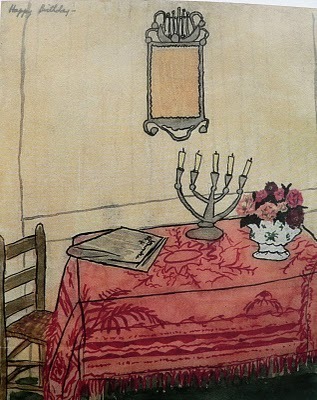
Happy Birthday Elizabeth Bishop: poet, painter, and prose writer. In the top left hand corner of this image is the message I'm sending to Miss Bishop in her own hand. "In this picture the tablecloth is part landscape, part map; the mirror part self, the newspaper part epic event." This Table with Candelabra, undated, was in the collection of Alice Methfessel, one of Bishop's lovers.
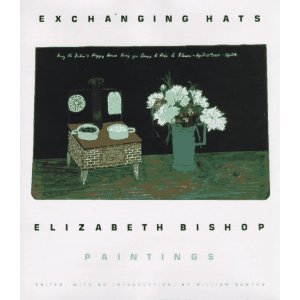
This watercolor is one of the many paintings Bishop did that are collected in Exchanging Hats . William Benton collected these forty-two paintings both from Vassar College and private collections all across the country for a gallery exhibit in the East Martello Museum, Key West, 1993.
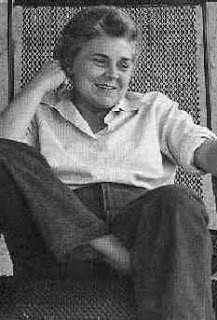
I love how happy she looks in this photograph - one leg tucked behind the back of her other knee. I imagine her both intense and playful, capable of great sadness and great friendship. And although I never met her, never heard her read (although we both lived in Boston at the same time) I feel a strong kinship with her. Perhaps I will raise a glass to her tonight as I meet with other writer friends. I think she would approve.
Published on February 08, 2011 04:30
February 7, 2011
Elizabeth Bishop in Key West: Birthday Count Down
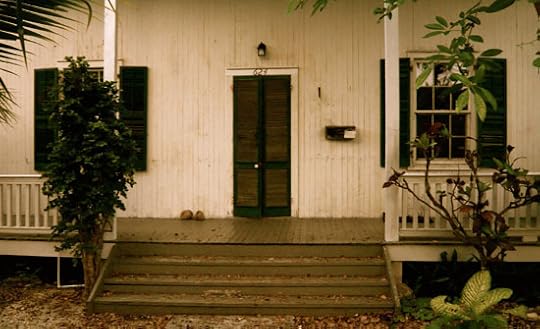
Elizabeth Bishop first came to Key West in the 1930s. She lived in this nineteenth-century clapboard eyebrow house at 624 White Street off and on from 1938 to 1946. In a letter to Marianne Moore she wrote: "It is very nice here; I wish so much that you and your mother could come here sometime, I am so sure you would like it. The sea is so beautiful– all spotted and striped, from dark black-blue to what my aunt calls 'lettuce' green."
Key West is the site of a wonderful writers' conference: Key West Literary Seminars each January. One of these years I very much hope to visit. There was a session on Bishop at AWP,
the same time as my flight left. Anyone catch it and want to report?
Published on February 07, 2011 07:25
February 6, 2011
Happy Birthday Elizabeth Bishop: Bishop turns 100 on Tuesday
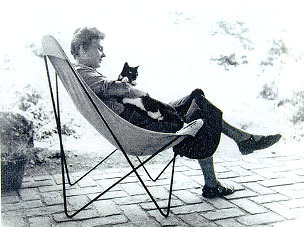 A long time "dead mentor" of mine and an inspiration for me is Elizabeth Bishop. She turns 100 on Tuesday and this seems a perfect opportunity to highlight her poems, her paintings, her prose, and her life all week long. Here is a poem to begin the celebration!
A long time "dead mentor" of mine and an inspiration for me is Elizabeth Bishop. She turns 100 on Tuesday and this seems a perfect opportunity to highlight her poems, her paintings, her prose, and her life all week long. Here is a poem to begin the celebration!One Art
The art of losing isn't hard to master;
so many things seem filled with the intent
to be lost that their loss is no disaster.
Lose something every day. Accept the fluster
of lost door keys, the hour badly spent.
The art of losing isn't hard to master.
Then practice losing farther, losing faster:
places, and names, and where it was you meant
to travel. None of these will bring disaster.
I lost my mother's watch. And look! my last, or
next-to-last, of three loved houses went.
The art of losing isn't hard to master.
I lost two cities, lovely ones. And, vaster,
some realms I owned, two rivers, a continent.
I miss them, but it wasn't a disaster.
--Even losing you (the joking voice, a gesture
I love) I shan't have lied. It's evident
the art of losing's not too hard to master
though it may look like (Write it!) like disaster.Elizabeth BishopI'm beginning the week with my favorite poem of Bishop's; perhaps this is my favorite poem of all time. The villanelle with the end rhyme of "master distaster" has helped me through more than one difficult experience in life. I've memorized this poem and imagine if I am ever imprisoned in solitary confinement, this poem will keep me sane. I've shared this poem with students and each time there is someone who falls in love with poetry, and someone else who needs this poem because they are nursing a bruised heart. Even if one's heart is singing, the poem retains its power: a kind of how-to manual for a fractured world.
Published on February 06, 2011 19:00
February 1, 2011
See you at Bus Boys and Poets (K Street) at 7:00 pm Thursday
[image error]
I am looking forward to arrival in DC - but not the flight itself! Perhaps I will get to sleep or actually sit and think. I think I will absolutel outlaw grading papers on the flight. Instead, I will put together a fun reading for:
7:00 PM, Thursday night, please join me at Bus Boys and Poets (K Street ) for the White Pine Press reading. I will read with four other White Pine Press writers, all of whom have books out this year. I'm looking forward to seeing old friends from a decade ago as well as new friends that perhaps I have yet to meet face to face.
If you can't make the reading, I will be signing books at 2:00 PM, Thursday, at the White Pine Press table. Please come by and say hello. I have a dread of twiddling my thumbs while people push by me trying to get to the book next to mine. When I read in Portland (Oregon) there were many people who looked at my book, The Alchemist's Kitchen, and were disappointed that it was not a cook book.
For all the craziness of AWP, I know that this is where my tribe meets and my tribe is not looking for a cookbook. See you there -- live or on-line.
7:00 PM, Thursday night, please join me at Bus Boys and Poets (K Street ) for the White Pine Press reading. I will read with four other White Pine Press writers, all of whom have books out this year. I'm looking forward to seeing old friends from a decade ago as well as new friends that perhaps I have yet to meet face to face.
If you can't make the reading, I will be signing books at 2:00 PM, Thursday, at the White Pine Press table. Please come by and say hello. I have a dread of twiddling my thumbs while people push by me trying to get to the book next to mine. When I read in Portland (Oregon) there were many people who looked at my book, The Alchemist's Kitchen, and were disappointed that it was not a cook book.
For all the craziness of AWP, I know that this is where my tribe meets and my tribe is not looking for a cookbook. See you there -- live or on-line.
Published on February 01, 2011 18:53
January 31, 2011
Wherever We Travel by Linda Pastan
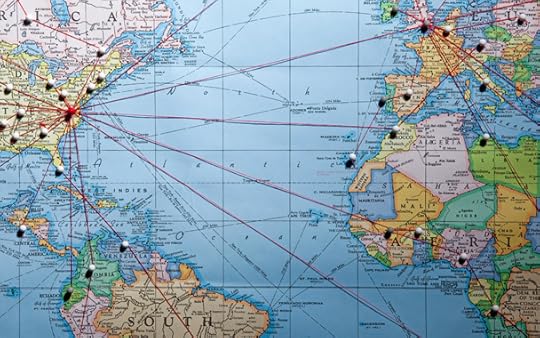
Wherever We TravelWherever we travel
it seems to take the same
few hours to get there.The plane rises over clouds
into an unmarked sky,
comes down through cloudsto what we have to believe
is a different place. But here
are the same green road signsthe numbered highways
of home, with cars going
back and forth to houseswith chimneys and windows
identical to the ones we thought
we had left behind.The radio blares familiar
radio music. Soon we will knock
on a door and someone will greet us,will pull us into a room
we have never seen
but already know by heart.
"Wherever We Travel," by Linda Pastan from The Last Uncle(W.W. Norton).
Published on January 31, 2011 21:38

